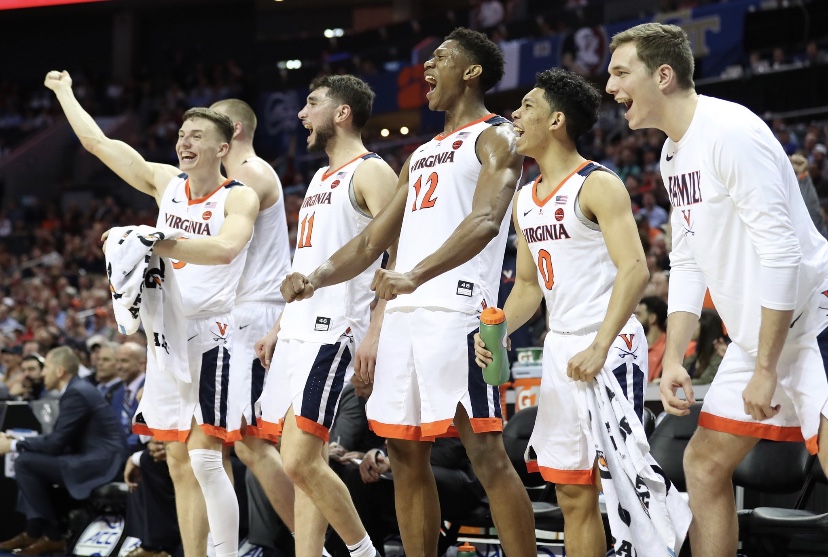Today begins my series explaining the road that each of the four teams took in order to get to the Final Four, in this I will go over what storylines each team had, as well as how the team actually got to the Final Four. This will go in order of how each team is seeded, so as a result, today I will start with the Virginia Cavaliers, who are in their first Final Four since 1984.
The Cavaliers came into the year off a devastating loss, where they became the first one seed to be lose to a 16 seed, as UMBC took down the Cavaliers in the first round last year. That loss is a tough one to take but this years team still had all the ingredients to win as the trio of Kyle Guy, Ty Jerome, and De’Andre Hunter all returned for an extra year of school.
In the regular season the Cavaliers were excellent, going 28-2, with both losses coming to Duke. This record helped lift them win the ACC regular season title. Three Virginia players were put on All-ACC teams, with Kyle Guy and De’Andre Hunter being on the first team and Ty Jerome making the second team. The Cavaliers won their first game in the ACC Tournament against NC State but then lost surprisingly to Florida State in the ACC Tournament quarterfinals. Despite the loss, Virginia still earned a one seed entering the NCAA Tournament, meaning they would once again be favorites to go to the Final Four.
While the regular season was once again good for Virginia, they still had not achieved anything good because this team was always going to be judged by what they do in the NCAA Tournament. In previous years, the Cavaliers have been on the wrong end of some upsets, most notably of course against UMBC, although blowing a 16-point lead to Syracuse in the Elite Eight was another devastating loss.
The Cavaliers looked to make quick work of their 16 seed Gardner-Webb, to put away some of the 16 seed demons, although things didn’t exactly work out that way, as the Cavaliers got down early by 14 and for a minute it seemed like they were going to be on the wrong end of another 16 over 1 upset. The Cavaliers made it only a six point halftime deficit and then in the second half took full control. De’Andre Hunter had a game-high 23, while Kihei Clark and Mamadi Diakite played big minutes for the Cavaliers in their win.
Following that game, Tony Bennett made a new starting lineup, one that featured both Kihei Clark and Mamadi Diakite, which removed longtime starter Jack Salt from the lineup. The Cavaliers struggled on offense, shooting 7-24 from three, which included an 0-10 performance by Kyle Guy from three. Still with the well known pack-line defense, this team was able to hold Oklahoma’s offense in check in order to advance to the Sweet 16.
Virginia’s next matchup was against a red-hot Oregon team that was playing really well on the defensive end and as a result, this game became one of the best grind-it out games of recent memory. Virginia and Oregon went back and forth for most of the second half, although Virginia found itself down 45-42 with 5:43 left. Following that Kihei Clark hit a game-tying three, with Ty Jerome hitting a three that put Virginia up 48-45 with 3:34 left in the game.
The Cavaliers matchup with Purdue was an essential road game as they were playing in Louisville, which is just on the border of Purdue, a state with a lot of Purdue fans. The game started with Purdue on fire as a team, as they jumped out to a 25-16 lead early on. Although thanks to a lineup switch that put Jack Salt in the game in place of Kihei Clark, the Cavaliers were able to slow the game down and make it only a one point lead at the half.
The Cavaliers started the second half on a 10-2 run that was headed by Kyle Guy knocking down two big threes that finally got him back on track shooting the ball. The Cavaliers led by as many as eight early on in the second half but thanks in part to a Carsen Edwards onslaught from three-point territory, Purdue was able to hang around and counterpunch a now hot Virginia team. The Cavaliers led 67-66 before Carsen Edwards hit his tenth three-pointer of the game that was banked in to give Purdue a 69-67 lead. After a miss, a foul, and pne made
Up three, Matt Painter decided to foul Ty Jerome with 5.9 seconds to go. After making the first and missing the second Mamadi Diakite tipped it out to the backcourt, where Kihei Clark retrieves the ball and passes it ahead to Diakite who hits the game-tying jumper to force overtime. In overtime, the game went back and forth, down one De’Andre Hunter made a drive to put Virginia up by one. Carsen Edwards tried to hit a three late, however, it didn’t drop. Virginia went on to make four free throws to put the game away, which was sandwiched in between a Purdue turnover. As a result, Virginia beat Purdue 80-75 in order to advance to the Final Four.
This Final Four appearance represents the programs first Final Four appearance since 1984. This win also erased Tony Bennett from all the “best coach to never make a Final Four” and “Virginia can’t win in March” conversations as well. As for the team as a whole, it puts the loss to UMBC last year behind them, as now they have proven that they are capable of advancing to a Final Four.
